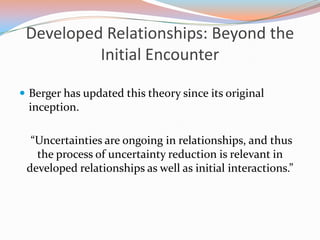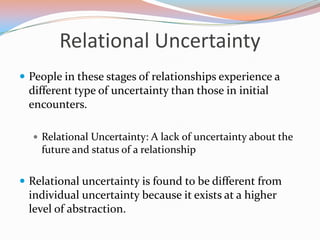Alexis hankh com 103 uncertainty reduction tip
- 1. Developed Relationships: Beyond the Initial Encounter Berger has updated this theory since its original inception. “Uncertainties are ongoing in relationships, and thus the process of uncertainty reduction is relevant in developed relationships as well as initial interactions.”
- 2. The Inclusion of Three Antecedent ConditionsThe three antecedent conditions that point us toward an examination of uncertainty in developed relationships include:1) Potential for Reward or Punishment2) Deviation from Expectations3) Anticipation of Future Interactions“We will expect rewards from, be surprised by, and anticipate future interactions with those with whom we have ongoing relationships.”
- 3. Differences in URT Between Initial Interactions and Developed RelationshipsThere may be a tension between reducing and increasing uncertainty in developed relationships.People have a greater desire for uncertainty when they feel secure than they do when they feel insecure.“While uncertainty reduction may be rewarding up to a point, the ability to completely predict another’s behavior might lead to boredom.”
- 4. Uncertainty Reduction ProcessesUncertainty and uncertainty reduction processes operate in dating relationships similar to the ways they do in initial interactions.Reducing uncertainty is a primary goal in dating.Dating couples are motivated to reduce uncertainty through communication.
- 5. Application of Axiom 8Axiom 8: The more people interact with the friends and family members of their relational partner, the less uncertainty they experience. Members may comment on the partner’s past actions and behavioral tendencies.Members may supply ready-made explanations for the partner’s behavior.The less uncertainty people feel, the less likely they will be to dissolve a relationship with another.
- 6. Relational UncertaintyPeople in these stages of relationships experience a different type of uncertainty than those in initial encounters.Relational Uncertainty: A lack of uncertainty about the future and status of a relationshipRelational uncertainty is found to be different from individual uncertainty because it exists at a higher level of abstraction.
- 7. Relational Uncertainty StudyIn 2001, Marianne Dainton and Brooks Aylor examined how relational uncertainty operated in three different types of relationships. 1) Long distance with no face to face interaction2) Long distance with some face to face interaction3) Geographically close relationships
- 8. ConclusionBranch of Knowledge:Axiology: A branch of knowledge focused on what is worth knowingGuidelines: Covering Law Approach: A guideline for creating theory suggesting that theories conform to a general law that is universal and invariantCovering law theories are constructed to move from statements that are presumed to be true to statements that are derived from these truisms.
- 10. Personal ApplicationI have been in a relationship with my boyfriend for three years and the theory of Uncertainty Reduction in Developed Relationships really applies to the way we interact.Three antecedent conditionsNeed for some uncertainty Interacting with social networks
- 11. Discussion QuestionWith so many online services available, do you think online dating reduces the level of relational uncertainty in a relationship from the beginning? If so, do you think this is a positive or negative attribute of the online dating services?











